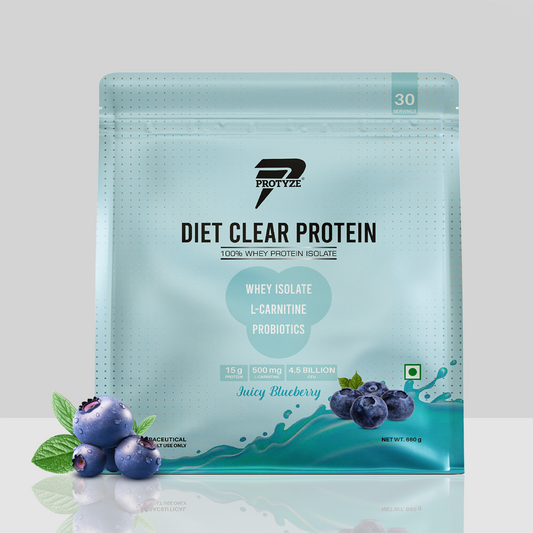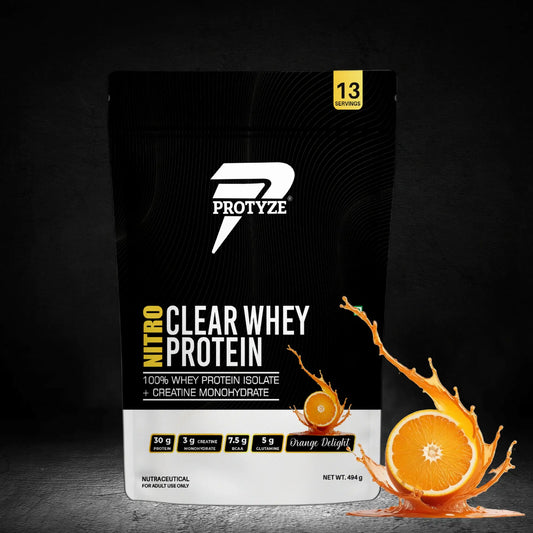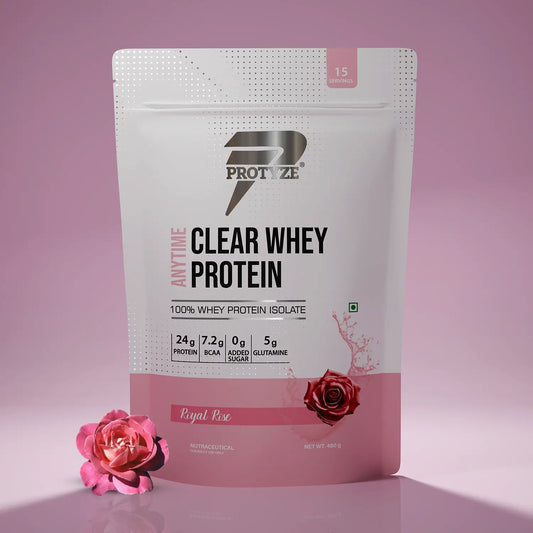Vitamins are essential nutrients that your body needs to function properly, supporting everything from energy production to immune health. But not all vitamins are the same—they’re divided into two main categories: water-soluble and fat-soluble. Understanding the differences between these two types is crucial for optimizing your nutrition, ensuring proper absorption, and maintaining overall wellness.
This blog explores water-soluble and fat-soluble vitamins, their roles in the body, how they’re absorbed, dietary sources, and why their differences matter for your health. We’ll also highlight Protyze Diet Clear Whey Protein, a low-calorie, probiotic-enhanced protein supplement with flavors like Juicy Mango, to complement your vitamin intake and support a balanced lifestyle. Whether you’re looking to improve your diet or address specific health needs, this article will help you understand the importance of vitamins.
What Are Water-Soluble and Fat-Soluble Vitamins?
Vitamins are organic compounds that your body needs in small amounts to perform vital functions. They’re classified into two groups based on how they dissolve and are stored in the body:
- Water-Soluble Vitamins: These dissolve in water and are not stored in large amounts in the body. They include vitamin C and the B-complex vitamins (B1, B2, B3, B5, B6, B7, B9, and B12). Excess amounts are excreted through urine, so you need to consume them regularly.
- Fat-Soluble Vitamins: These dissolve in fats and oils and are stored in the body’s fatty tissues and liver. They include vitamins A, D, E, and K. Because they’re stored, you don’t need to consume them as frequently, but overconsumption can lead to toxicity.
The differences in solubility affect how these vitamins are absorbed, used, and stored, which has important implications for your diet and health.
Water-Soluble Vitamins: Roles, Absorption, and Sources
Water-soluble vitamins are absorbed directly into the bloodstream through the digestive tract, making them readily available for use. Since your body doesn’t store them in large amounts, you need a consistent supply through your diet to avoid deficiencies.
Roles in the Body
-
Vitamin C:
- Supports immune function by helping white blood cells fight infections.
- Acts as an antioxidant, protecting cells from damage caused by free radicals.
- Promotes collagen production for healthy skin, joints, and blood vessels.
- Enhances iron absorption, reducing the risk of anemia.
-
B-Complex Vitamins:
- B1 (Thiamine): Converts carbs into energy, supporting brain and nerve function.
- B2 (Riboflavin): Supports energy production and maintains healthy skin and eyes.
- B3 (Niacin): Aids in energy metabolism and supports skin, nerve, and digestive health.
- B5 (Pantothenic Acid): Helps produce hormones and supports energy metabolism.
- B6 (Pyridoxine): Supports brain health, red blood cell production, and mood regulation.
- B7 (Biotin): Promotes healthy hair, skin, and nails, and aids in energy metabolism.
- B9 (Folate): Essential for DNA synthesis, cell division, and preventing birth defects.
- B12 (Cobalamin): Supports nerve function, red blood cell production, and energy levels.
Absorption and Excretion
Water-soluble vitamins are absorbed in the small intestine and transported directly into the bloodstream. Because they dissolve in water, they don’t require fats for absorption. However, your body only keeps what it needs at the moment—any excess is filtered by the kidneys and excreted in urine. This means:
- You’re less likely to experience toxicity from overconsumption.
- You need to consume these vitamins regularly to maintain adequate levels.
Dietary Sources
- Vitamin C: Citrus fruits (oranges: 70mg/fruit), strawberries (98mg/100g), bell peppers (128mg/100g), broccoli (89mg/100g).
- B-Complex Vitamins:
- B1: Whole grains (brown rice: 0.2mg/100g), pork (0.9mg/100g), nuts.
- B2: Dairy (milk: 0.2mg/100ml), eggs (0.5mg/egg), leafy greens.
- B3: Chicken (8mg/100g), tuna (10mg/100g), peanuts (12mg/100g).
- B5: Mushrooms (1.5mg/100g), avocados (1.4mg/fruit), eggs.
- B6: Chickpeas (0.5mg/100g), salmon (0.6mg/100g), bananas (0.4mg/fruit).
- B7: Eggs (10mcg/egg), salmon (5mcg/100g), almonds (1.5mcg/28g).
- B9: Leafy greens (spinach: 194mcg/100g), lentils (181mcg/100g), fortified cereals.
- B12: Animal products (beef: 2.4mcg/100g, salmon: 3.2mcg/100g, fortified plant milks).
Why It Matters
Because water-soluble vitamins aren’t stored, you need to include them in your diet daily. Deficiencies can develop quickly if your intake is low—for example, low B12 can lead to fatigue and nerve issues, while insufficient vitamin C can cause scurvy, affecting skin and gum health. On the flip side, overconsumption is rarely a concern, as excess is excreted.
Fat-Soluble Vitamins: Roles, Absorption, and Sources
Fat-soluble vitamins are absorbed with dietary fats and stored in the body’s fatty tissues and liver, making them available for use over time. This storage capability means you don’t need to consume them as frequently, but it also increases the risk of toxicity if you take too much.
Roles in the Body
- Vitamin A:
- Supports vision, especially in low light, by forming rhodopsin in the eyes.
- Promotes healthy skin and mucous membranes, acting as a barrier against infections.
- Supports immune function and cell growth.
- Vitamin D:
- Enhances calcium absorption for strong bones and teeth.
- Supports immune health, reducing infection risk.
- Influences mood regulation, potentially reducing depression risk.
- Vitamin E:
- Acts as an antioxidant, protecting cells from oxidative damage.
- Supports immune function and skin health.
- Helps with blood vessel health and prevents excessive clotting.
- Vitamin K:
- Essential for blood clotting, helping wounds heal properly.
- Supports bone health by aiding in calcium binding to bones.
Absorption and Storage
Fat-soluble vitamins are absorbed in the small intestine with the help of dietary fats. They’re then transported via the lymphatic system and stored in the liver and fatty tissues. Because of this:
- They’re best absorbed when consumed with a meal containing fats (e.g., avocado, nuts, or olive oil).
- They can accumulate in the body, increasing the risk of toxicity if you consume too much over time.
- Deficiencies are less common because your body can draw on stored reserves, but they can develop with prolonged low intake or fat absorption issues (e.g., in conditions like celiac disease).
Dietary Sources
- Vitamin A: Liver (6,582mcg/100g), carrots (835mcg/100g), sweet potatoes (709mcg/100g), spinach (469mcg/100g).
- Vitamin D: Fatty fish (salmon: 11mcg/100g), fortified dairy (milk: 1.2mcg/100ml), egg yolks (1mcg/yolk), sunlight exposure (10-30 min/day).
- Vitamin E: Nuts (almonds: 25mg/100g), seeds (sunflower seeds: 35mg/100g), spinach (2mg/100g), avocado (2mg/fruit).
- Vitamin K: Leafy greens (kale: 390mcg/100g), broccoli (102mcg/100g), fermented foods (natto: 1,000mcg/100g).
Why It Matters
Fat-soluble vitamins are crucial for long-term health, but their storage in the body means you need to be mindful of intake. For example, too much vitamin A can lead to toxicity (hypervitaminosis A), causing nausea, dizziness, or even liver damage, while too much vitamin D can cause high calcium levels, affecting the kidneys. On the other hand, deficiencies can have serious effects—low vitamin D can lead to weak bones (rickets in children, osteomalacia in adults), and low vitamin K can impair blood clotting.
Why the Difference Between Water-Soluble and Fat-Soluble Vitamins Matters
Understanding the differences between these two types of vitamins is important for several reasons:
| Feature | Water-Soluble Vitamins | Fat-Soluble Vitamins |
|---|---|---|
| Examples | Vitamin C, B1, B2, B3, B5, B6, B7, B9, B12 | Vitamins A, D, E, K |
| Solubility | Dissolve in water | Dissolve in fats |
| Absorption | Directly into bloodstream | Absorbed with dietary fats in the small intestine |
| Storage in Body | Not stored; excess excreted in urine | Stored in liver and fat tissues |
| Toxicity Risk | Low (excess flushed out) | Higher if overconsumed |
| Daily Requirement | Needed daily due to minimal storage | Less frequent due to storage capability |
| Main Functions | Energy metabolism, immunity, nerve health | Vision, bone health, antioxidant defense |
| Sources | Citrus fruits, grains, eggs, greens, fish | Carrots, fish, nuts, seeds, leafy greens |
| Consumption Tip | With water; spread intake across meals | With meals containing healthy fats |
| Protyze Synergy | Pair with vitamin C-rich fruits for a nutrient boost | Combine with fat-rich meals for optimal absorption |
Absorption and Timing
- Water-Soluble: These vitamins are absorbed easily with water, so you don’t need to pair them with fats. They’re best taken with meals to improve absorption and reduce stomach discomfort (e.g., vitamin C can irritate an empty stomach).
- Fat-Soluble: These vitamins require dietary fat for absorption, so they’re best consumed with a meal containing healthy fats, like nuts, avocado, or olive oil. For example, eating a salad with spinach (vitamin K) and a drizzle of olive oil ensures better absorption.
Storage and Frequency
- Water-Soluble: Because they’re not stored, you need a daily supply through foods or supplements. Missing them for a few days can lead to symptoms of deficiency, like fatigue from low B vitamins.
- Fat-Soluble: Since they’re stored, you don’t need to consume them every day. However, this storage means you should avoid excessive intake, especially from supplements, to prevent toxicity.
Risk of Deficiency or Toxicity
- Water-Soluble: Deficiencies are more common if your diet lacks variety, but toxicity is rare since excess is excreted. For example, vegans might be at risk of B12 deficiency if they don’t eat fortified foods or supplements.
- Fat-Soluble: Deficiencies are less common due to storage, but they can occur with poor fat absorption (e.g., in digestive disorders). Toxicity is a bigger concern—high doses of vitamin A from supplements can cause serious side effects, while excess vitamin D can lead to kidney issues.
Dietary and Lifestyle Implications
- Water-Soluble: You need a consistent intake of fruits, vegetables, whole grains, and proteins to meet your needs. Cooking methods matter—boiling vegetables can leach out water-soluble vitamins, so steaming or eating raw is better.
- Fat-Soluble: Including healthy fats in your diet is key to absorbing these vitamins. If you’re on a very low-fat diet, you might not absorb enough, even if you’re eating vitamin-rich foods. Sunlight exposure is also crucial for vitamin D, which isn’t found in many foods.
Understanding these differences helps you make smarter choices about your diet, supplements, and overall health strategy, ensuring you’re getting the right balance of vitamins without risking deficiencies or excesses.
How to Ensure You’re Getting Both Types of Vitamins
To support your health, you need a balanced intake of both water-soluble and fat-soluble vitamins. Here’s how to do it:
Eat a Varied, Nutrient-Dense Diet
- For Water-Soluble Vitamins:
- Include fruits and vegetables daily for vitamin C (e.g., an orange or bell pepper with lunch).
- Choose whole grains, legumes, and proteins for B vitamins (e.g., oatmeal for breakfast, lentils for dinner).
- If you’re vegan, consider fortified foods or a B12 supplement to avoid deficiency.
- For Fat-Soluble Vitamins:
- Eat foods rich in healthy fats alongside fat-soluble vitamins (e.g., salmon with spinach for vitamin D and K).
- Get 10-30 minutes of sunlight exposure a few times a week for vitamin D, depending on your skin tone and location.
- Include colorful veggies like carrots and sweet potatoes for vitamin A, and nuts or seeds for vitamin E.
Pair with Protein for Overall Wellness
Protein supports overall health by aiding in muscle repair, enzyme production, and nutrient transport—all of which help your body use vitamins effectively. A light, protein-rich option like Protyze Diet Clear Whey Protein (15g protein, 99% lactose-free, Juicy Mango flavor) mixed with water can be a convenient addition to your diet, providing protein and probiotics to support digestion and nutrient absorption alongside your vitamin intake.
Be Mindful of Cooking and Storage
- Water-Soluble: Minimize boiling vegetables to retain B vitamins and vitamin C—steam or eat them raw instead. Store fruits and veggies properly, as exposure to air and light can degrade these vitamins.
- Fat-Soluble: Cook with healthy fats like olive oil to enhance absorption of vitamins A, D, E, and K. For example, roast sweet potatoes with a drizzle of olive oil to boost vitamin A absorption.
Consider Your Lifestyle and Needs
- Water-Soluble: If you’re under stress, very active, or recovering from illness, your need for B vitamins and vitamin C might increase, as they’re used up faster.
- Fat-Soluble: If you’re on a low-fat diet or have a condition affecting fat absorption (e.g., IBS), you might need to focus on getting enough fat-soluble vitamins through supplements or fortified foods, but consult a doctor first.
Use Supplements Wisely
- Water-Soluble: If your diet lacks variety, a B-complex or vitamin C supplement can help, but focus on food sources first. Excess is excreted, so toxicity is rare, but high doses of vitamin C can cause diarrhea.
- Fat-Soluble: Be cautious with supplements, as they can accumulate. For example, vitamin D supplements are common for those with limited sun exposure, but stick to recommended doses (e.g., 10-20mcg/day) to avoid toxicity. Always consult a healthcare provider before starting supplements.
Integrating Vitamin-Rich Habits into a Healthy Lifestyle
To ensure you’re getting both types of vitamins, integrate them into a balanced lifestyle with proper nutrition, exercise, hydration, and rest. Here’s how:
Nutritional Synergy
- Balanced Diet: Combine foods rich in both types of vitamins:
- Breakfast: Greek yogurt (B12), berries (vitamin C), and nuts (vitamin E).
- Lunch: Salmon (vitamin D), spinach salad (vitamin K), and olive oil dressing.
- Snack: Protyze Diet Clear Whey Protein (15g protein, Juicy Blueberry) with water, paired with an orange (vitamin C).
- Dinner: Chicken (B3), sweet potato (vitamin A), and broccoli (vitamin K).
- Macronutrient Balance: Aim for:
- Carbs: 2-4g/kg body weight (140-280g for 70kg) from fruits, vegetables, whole grains.
- Protein: 1.2-2.0g/kg (84-140g for 70kg) from whole foods and shakes.
- Fats: 0.5-1g/kg (35-70g for 70kg) from healthy sources to aid fat-soluble vitamin absorption.
Exercise and Activity
- Strength Training: 3-5 sessions/week (45-60 min) with exercises like squats and push-ups to support muscle health, aided by B vitamins for energy and vitamin D for bone strength.
- Cardio: 150-300 min/week of moderate activity (e.g., jogging, cycling) to boost overall health, supported by vitamin C for immune function.
- Sunlight Exposure: 10-30 min a few times a week during outdoor activities to naturally increase vitamin D levels.
Hydration and Recovery
- Hydration: Drink 2.5-3.5L water daily to support the absorption of water-soluble vitamins and overall health, with clear whey shakes contributing to fluid intake.
- Sleep: Aim for 7-9 hours nightly to allow your body to use vitamins for repair and recovery, especially fat-soluble vitamins stored in tissues.
- Stress Management: Practice 5-10 min of deep breathing or meditation daily to lower stress, which can deplete B vitamins and vitamin C.
Sample Daily Plan (70kg Person)
- Morning: 30 min walk (sunlight for vitamin D), oatmeal with berries (vitamin C), 2 eggs (B12), handful of almonds (vitamin E).
- Mid-Morning: Protyze Diet Clear Whey (15g protein, Juicy Mango) with 200ml water, orange (vitamin C).
- Lunch: Grilled chicken (B3), quinoa, spinach salad with olive oil (vitamin K), glass of fortified almond milk (vitamin D).
- Afternoon: 45 min strength training, Greek yogurt (B12), apple.
- Dinner: Salmon (vitamin D), sweet potato (vitamin A), broccoli (vitamin K), glass of water.
- Evening: Herbal tea, 10 min meditation, 8 hours sleep.
- Daily: 3L water, balanced meals with healthy fats.
- Timeline: Improved energy and immunity in 2-4 weeks; better overall health in 8-12 weeks.
Common Mistakes to Avoid with Vitamins
- Ignoring Dietary Fat: Skipping fats when eating fat-soluble vitamins (e.g., a plain salad with no dressing) reduces absorption. Always pair with healthy fats.
- Overloading on Supplements: High doses of fat-soluble vitamins can lead to toxicity—stick to recommended amounts and focus on food sources.
- Not Eating Enough Variety: Relying on the same foods can lead to deficiencies in water-soluble vitamins, as they need to be replenished daily.
- Overcooking Vegetables: Boiling veggies can leach out water-soluble vitamins like B and C—steam or eat raw to preserve them.
- Skipping Medical Advice: If you have health conditions or take medications, some vitamins (e.g., vitamin K with blood thinners) might interact. Consult a doctor before supplementing.
Conclusion
Understanding the difference between water-soluble and fat-soluble vitamins is key to optimizing your nutrition and supporting your health. Water-soluble vitamins like C and B-complex need to be consumed regularly to avoid deficiencies, while fat-soluble vitamins like A, D, E, and K require careful intake to prevent toxicity due to their storage in the body. By eating a varied diet, pairing fat-soluble vitamins with healthy fats, and ensuring consistent intake of water-soluble vitamins, you can meet your body’s needs effectively.
Protyze Diet Clear Whey Protein, with its 15g protein, low-calorie, probiotic-enhanced, 99% lactose-free formula, complements your vitamin intake by supporting digestion and overall wellness in flavors like Juicy Mango and Juicy Blueberry. Combine these strategies with a balanced lifestyle—nutritious meals, regular exercise, hydration, and rest—to ensure your body gets the vitamins it needs to thrive in 2025. Start making informed choices today, and enjoy the benefits of a well-nourished body.





